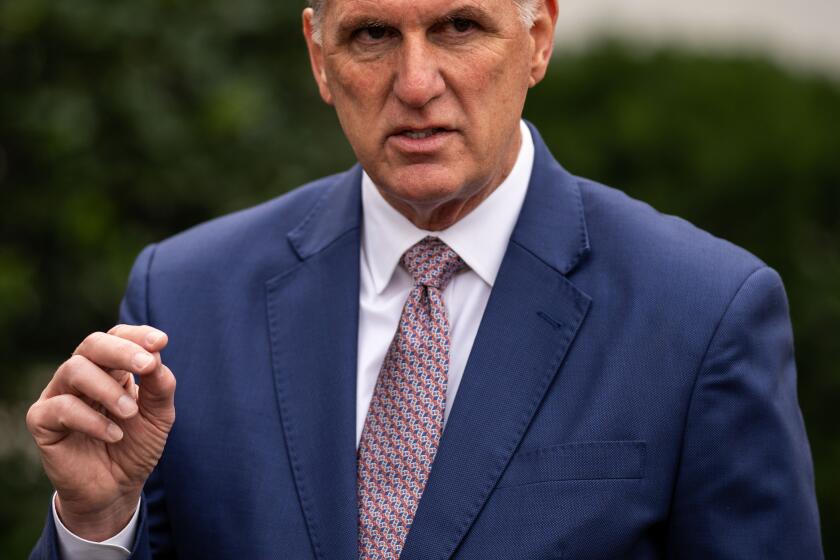Column: Why America can’t put a dent in its $31-trillion debt

- Share via
The tsunami is upon us.
Since the Reagan era, budget experts have warned that without changes to Social Security and Medicare, a huge wave of spending would build as baby boomers claimed their benefits and healthcare prices rose. Ultimately that swell would swamp the economy — a “demographic tsunami,” as economist Robert Reischauer called it when he headed the Congressional Budget Office. To past presidents and lawmakers, the crisis seemed far off: the early 2020s, into the 2030s.
That’s now, of course. So it couldn’t be a worse time for President Biden and Republicans to agree, as they have, that these safety net programs are off the table as they face off in coming months over reducing the nation’s debt.
Opinion Columnist
Jackie Calmes
Jackie Calmes brings a critical eye to the national political scene. She has decades of experience covering the White House and Congress.
Social Security and Medicare are among the biggest drivers of America’s debt, which is now larger as a share of the economy than at any time since World War II. Negotiations that omit the two programs aren’t serious. The Republican promise to balance the budget is implausible enough; without big changes to Social Security and Medicare, it’s absurd. Meanwhile, untouched, both will continue on a path to insolvency, in 2028 for Medicare and 2034 for Social Security, it’s estimated.
On Thursday Biden makes the first move in the year’s debt dance, when he sends Congress his budget request for the fiscal year starting in October. He’ll propose to tinker with Medicare to keep it solvent to the 2050s, as part of $3 trillion in total reductions in deficits over 10 years, by raising taxes on wealthy Americans rather than curbing benefits. He knows it’s an offer Republicans will refuse.
Because, you know, tax hikes on the rich.
The federal government is on the brink of hitting its legal borrowing limit and is resorting to ‘extraordinary measures’ to avoid a default. Here’s what that means.
So, once again, a president and Congress will go another year putting off the inevitable: A deal to reinforce the retirement safety net for future generations before insolvency forces across-the-board benefit cuts.
Yet spare Biden the opprobrium he’d otherwise deserve for dereliction of leadership. Until Republicans drop their tired, irresponsible opposition to any new taxes, he’s right that neither Medicare nor Social Security should come under the knife.
Tax increases and spending reductions must be part of the mix. It’s simple math. But it also means shared sacrifice.
House Speaker Kevin McCarthy harrumphed in a recent speech that “of all the dangers we face, the greatest threat to our future is our national debt.”
The greatest threat? If McCarthy really believed that, he’d quit the anti-tax absolutism. He’d take some responsibility on behalf of his party, especially for the trillions it’s added to the pile by cutting taxes repeatedly. But then he wouldn’t be the speaker much longer.
We (barely) survived past GOP-induced default crises. This time, the most radical, least-seasoned House Republicans could force a looming economic cataclysm.
So McCarthy blamed “runaway spending by the Democrats” in his speech on the debt. He added, without irony, “Cuts to Medicare and Social Security are off the table.”
Republicans’ mantra against spending ignores the fact that cutting taxes adds to the debt as surely as spending does. They continue to claim that tax cuts are different, that they pay for themselves, despite 40 years of experience with the tax cuts of Ronald Reagan, George W. Bush and Donald Trump that proved otherwise.
Even Bush’s vice president conceded as much: When Dick Cheney famously said, “Reagan proved deficits don’t matter,” he was justifying the Bush administration’s second round of deep tax cuts amid concerns about growing budget deficits. (Remember, Bush inherited a surplus.)
Unlike many tax cuts, some government spending — for infrastructure, notably — actually does pay for itself in whole or part, providing taxpayers a return on the investment, according to studies.
And Republicans’ rants belie how much they like federal spending — a lot — for the military, farm and business subsidies, roads and bridges back home, disaster aid and much, much more. And their voters like the largesse too, even as they join in damning “big spending” Democrats.
True fiscal conservatives balance spending and taxes, as old-timey Republicans did. If spending consistently outstrips revenue — as it has annually for most of our lifetimes, regardless of who’s in power — that argues for raising some taxes to restore balance. Instead Republicans cut them.
Marjorie Taylor Greene leverages power with her ‘own the libs’ antics. Let’s give her what she deserves — as little attention as possible.
When Democrats created the Affordable Care Act, they paid for it with taxes on businesses that benefit from serving millions of newly insured Americans. Business groups supported the trade-off. In contrast, when Bush and a Republican-majority Congress created Medicare’s prescription drug benefit, they put the expense on the federal tab. In cahoots with drug makers, they even banned Medicare from negotiating for lower prices — a ban that Biden and Democrats lifted last year. (His new budget will call for expanding Medicare’s authority to bargain down drug costs.)
Under Trump, Republicans remained mostly mute as the debt increased by $8 trillion. Three times Congress raised the nation’s debt limit at his request so the U.S. could keep borrowing to pay its bills. Republicans set no preconditions.
With a Democrat in the White House, however, they’ve reemerged as deficit hawks, demanding cuts to balance the budget before they’ll support raising the debt limit this summer. But with Social Security and Medicare off limits, along with spending for defense and interest on the debt, only 15% of the budget — just about everything else government does, and voters expect it to do — remains. According to the centrist Committee for a Responsible Federal Budget, 85% of that small slice of the spending pie would have to be cut to balance the budget in a decade.
Not even Republicans would vote for that, slashing support for air traffic control, food and drug safety, medical research, education aid, homeland security and on and on. And they won’t vote for taxes either. Which raises the specter of an impasse, and a devastating default by the world’s economic superpower.
That’s not the tsunami that fiscal forecasters predicted. But it would be a catastrophe nonetheless. A man-made one.
More to Read
Get the latest from Jackie Calmes
Commentary on politics and more from award-winning opinion columnist.
You may occasionally receive promotional content from the Los Angeles Times.















